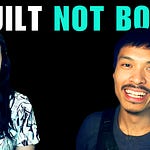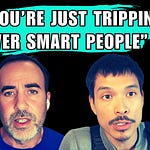What happens when your life crashes—literally—and you’re forced to pause?
What do you learn about yourself when you're bedridden, staring at a white ceiling, unable to hold up your own head?
For Rahul Chaudhari, that moment became the inflection point for a lifetime of introspection, innovation, and impact.
This episode of ABCs for Building the Future dives deep into the human behind the product—his painful experiences, his transformation, and his tenacious vision for building tech that matters.
The Episode at a Glance
Host: Robert Ta
Guest: Rahul Chaudhari, former Amazon product leader, now Head of Marketing & E-commerce Tech at Kohl’s
Theme: Navigating trauma, identity, and curiosity to lead with purpose in tech
This podcast unpacks the most potent moments from the conversation—and why they matter to entrepreneurs, executives, and builders everywhere.
1. Trauma as a Catalyst: The Accident That Changed Everything
Early in university, Rahul was hit head-on in a bicycle accident. His neck fractured. His body immobilized. His dreams on hold.
“I couldn’t even hold up my own head. Six months of staring at the ceiling gave me a new lens on life.”
This wasn’t just a physical recovery—it was a mental rewiring. He began to confront the uncomfortable truth: he was blindly following the herd, not choosing his path. That insight became his first lesson in intentional living—a mindset that would later shape every product and team he led.
Takeaway for Listeners:
Your defining moments may feel like devastation in the short-term—but they often create the depth that later defines your leadership.
2. Breaking Free from the Herd Mentality
Before the accident, Rahul was on the well-trodden path: a pharmaceutical undergrad planning to pursue a PhD abroad—because that’s what everyone around him was doing.
“I realized I was chasing something I didn’t choose. That accident gave me the pause to ask, what do I want?”
This awakening propelled him toward product and business—where curiosity, not conformity, would drive his career. In a world obsessed with optimization, his story is a bold reminder: sometimes, the real innovation is in questioning your default programming.
Takeaway for Listeners:
Entrepreneurs and execs: Your biggest breakthroughs might come from zooming out, not doubling down.
3. Curiosity as Craft: Building Across Domains
Rahul’s curiosity took him from retail banking to telecom, from CPG to e-commerce giants like Amazon. What connected all those roles? A relentless pursuit of meaningful problems to solve.
“I found my true home in product—because it lets you play at the intersection of people, systems, and possibilities.”
From launching products at Amazon to transforming martech at Kohl’s, Rahul has mastered the art of navigating complexity without losing humanity.
Takeaway for Listeners:
Versatility isn’t a lack of focus—it’s a superpower, especially when it’s fueled by mission and curiosity.
4. Philosophy, Not Just Frameworks
In today’s AI-driven world, Rahul reminds us: the best products aren’t just built—they’re believed in. This episode isn’t just a biography; it’s a reflection on the role of belief in innovation, tying beautifully into the broader goals of the Epistemic Me movement.
“It’s not just about scaling products—it’s about scaling insight, integrity, and intentionality.”
Takeaway for Listeners:
Great leaders don’t just ship features. They shape futures—through the stories they tell, the systems they build, and the beliefs they challenge.
Quotes to Remember
“Staring at the ceiling gave me the space to realize I wasn’t living my life—I was living someone else’s.”
“I used to chase what others wanted. Now I chase what matters.”
“Curiosity is the compass. Product is the playground.”
“We talk about innovation—but the real innovation is in how we choose to live.”
“I don't just build tech. I build tools that change how people experience the world.”
Why It Matters
“How can AI understand us if we don’t fully understand ourselves?”
We solve for this by create programmatic models of self, modeling belief systems, which we believe are the basis of defense against existential risk.
In the longevity tech space, we create tools that meet users where they are, helping them make better decisions, form healthier habits, and align with their deepest values.
Can’t get enough? Check out the companion newsletter to this podcast.
Get Involved
Epistemic Me is building the foundational tools to make this vision a reality—and we’re doing it in the open. Here’s how you can join the movement:
Check out the GitHub repo to explore our open-source SDK and start contributing.
Subscribe to the podcast for weekly insights on technology, philosophy, and the future.
Join the community. Whether you’re a developer, researcher, or someone passionate about the intersection of AI and humanity, we want to hear from you. Email me anytime!
FAQs
Q: What is Epistemic Me?
A: It’s an open-source SDK designed to model belief systems and make AI more human-aligned.
Q: Who is this podcast for?
A: Entrepreneurs, builders, developers, researchers, and anyone who’s curious about the intersection of technology, philosophy, and personal growth. If you’ve ever wondered how to align AI with human values—or just how to understand yourself better—this is for you.
Q: How can I contribute?
A: Visit epistemicme.ai or check out our GitHub to start contributing today.
Q: Why open source? A: Transparency and collaboration are key to building tools that truly benefit humanity.
Q: Why focus on beliefs in AI?
A: Beliefs shape our understanding of the world. Modeling them enables AI to adapt to human nuances and foster shared understanding.
Q: How does Epistemic Me work?
A: Our open-source SDK uses predictive models to help developers create belief-driven, hyper-personalized solutions for applications in health, collaboration, and personal growth. Think of it as a toolkit for understanding how people think and making better tools, apps, or decisions because of it.
Q: How is this different from other AI tools?
A: Most AI tools are about predictions and automation. Epistemic Me is about understanding—building models that reflect the nuances of human thought and behavior. And it’s open source!
Q: How can I get involved?
A: Glad you asked! Check out our GitHub.
Q: Who can join?
A: Developers, philosophers, researchers, scientists and anyone passionate about the underpinnings of human beliefs, and interested in solving for AI Alignment.
Q: How to start?
A: Visit our GitHub repository, explore our documentation, and become part of a project that envisions a new frontier in belief modeling.
Q: Why open-source?
A: It’s about harnessing collective intelligence for innovation, transparency, and global community involvement in shaping belief-driven solutions.
P.S. Check out the companion newsletter to this podcast, ABCs for Building The Future, where I also share my own written perspective of building in the open and entrepreneurial lessons learned.
And if you haven’t already checked out my other newsletter, ABCs for Growth—that’s where I have personal reflections on personal growth related to applied emotional intelligence, leadership and influence concepts, etc.
P.S.S. Want reminders on entrepreneurship, growth, leadership, empathy, and product?
Follow me on..











